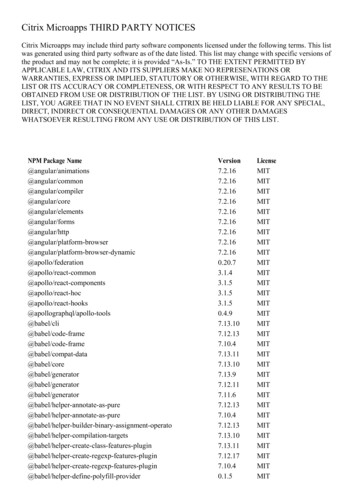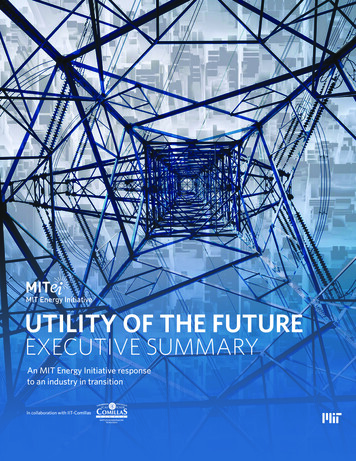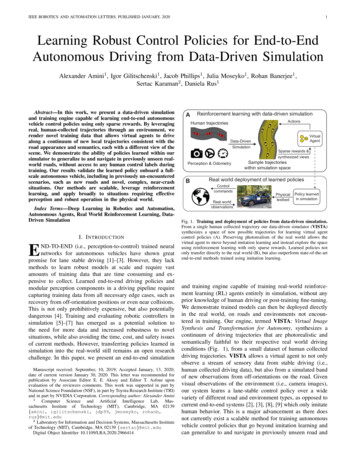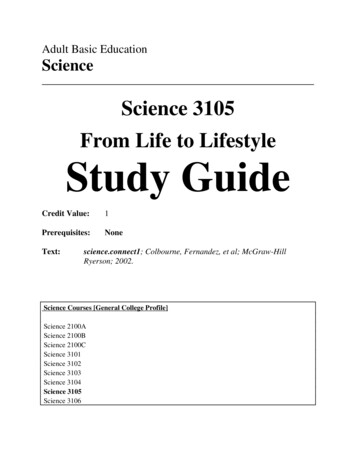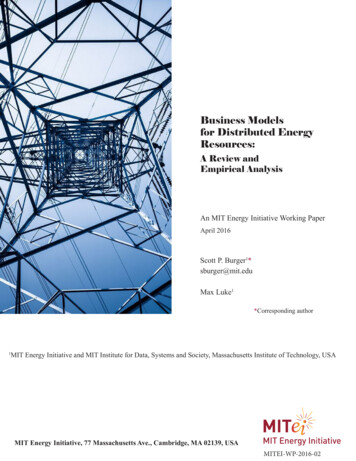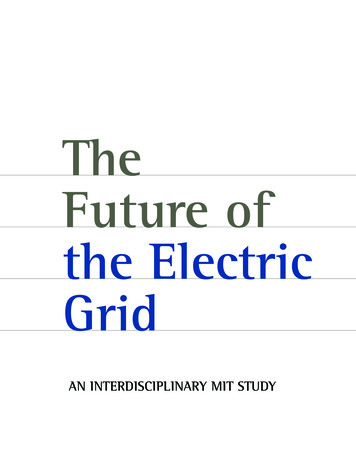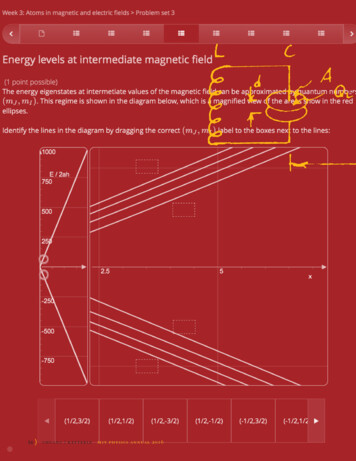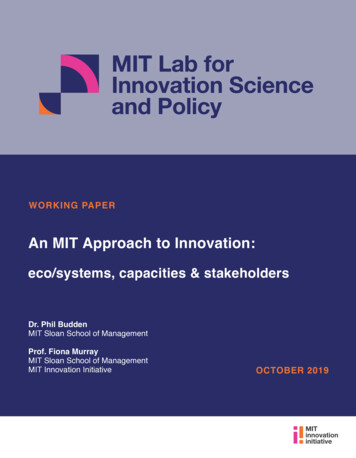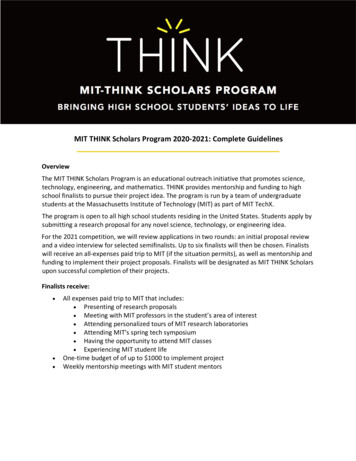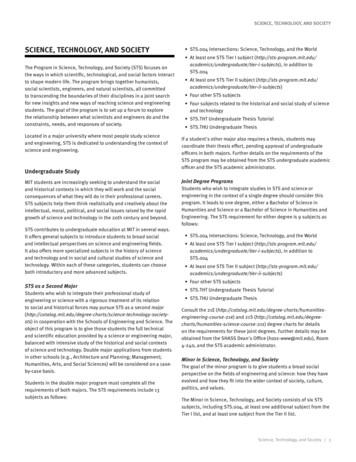
Transcription
SCIENCE, TECHNOLOGY, AND SOCIETYSCIENCE, TECHNOLOGY, AND SOCIETYThe Program in Science, Technology, and Society (STS) focuses onthe ways in which scienti c, technological, and social factors interactto shape modern life. The program brings together humanists,social scientists, engineers, and natural scientists, all committedto transcending the boundaries of their disciplines in a joint searchfor new insights and new ways of reaching science and engineeringstudents. The goal of the program is to set up a forum to explorethe relationship between what scientists and engineers do and theconstraints, needs, and responses of society.Located in a major university where most people study scienceand engineering, STS is dedicated to understanding the context ofscience and engineering.Undergraduate StudyMIT students are increasingly seeking to understand the socialand historical contexts in which they will work and the socialconsequences of what they will do in their professional careers.STS subjects help them think realistically and creatively about theintellectual, moral, political, and social issues raised by the rapidgrowth of science and technology in the 20th century and beyond.STS contributes to undergraduate education at MIT in several ways.It o ers general subjects to introduce students to broad socialand intellectual perspectives on science and engineering elds.It also o ers more specialized subjects in the history of scienceand technology and in social and cultural studies of science andtechnology. Within each of these categories, students can chooseboth introductory and more advanced subjects.STS as a Second MajorStudents who wish to integrate their professional study ofengineering or science with a rigorous treatment of its relationto social and historical forces may pursue STS as a second -technology-societysts) in cooperation with the Schools of Engineering and Science. Theobject of this program is to give those students the full technicaland scienti c education provided by a science or engineering major,balanced with intensive study of the historical and social contextsof science and technology. Double major applications from studentsin other schools (e.g., Architecture and Planning; Management;Humanities, Arts, and Social Sciences) will be considered on a caseby-case basis.Students in the double major program must complete all therequirements of both majors. The STS requirements include 13subjects as follows: STS.004 Intersections: Science, Technology, and the World At least one STS Tier I subject e/tier-i-subjects), in addition toSTS.004 At least one STS Tier II subject e/tier-ii-subjects) Four other STS subjects Four subjects related to the historical and social study of scienceand technology STS.THT Undergraduate Thesis Tutorial STS.THU Undergraduate ThesisIf a student's other major also requires a thesis, students maycoordinate their thesis e ort, pending approval of undergraduateo cers in both majors. Further details on the requirements of theSTS program may be obtained from the STS undergraduate academico cer and the STS academic administrator.Joint Degree ProgramsStudents who wish to integrate studies in STS and science orengineering in the context of a single degree should consider thisprogram. It leads to one degree, either a Bachelor of Science inHumanities and Science or a Bachelor of Science in Humanities andEngineering. The STS requirement for either degree is 9 subjects asfollows: STS.004 Intersections: Science, Technology, and the World At least one STS Tier I subject e/tier-i-subjects), in addition toSTS.004 At least one STS Tier II subject e/tier-ii-subjects) Four other STS subjects STS.THT Undergraduate Thesis Tutorial STS.THU Undergraduate ThesisConsult the 21E gineering-course-21e) and 21S ience-course-21s) degree charts for detailson the requirements for these joint degrees. Further details may beobtained from the SHASS Dean's O ce (hass-www@mit.edu), Room4-240, and the STS academic administrator.Minor in Science, Technology, and SocietyThe goal of the minor program is to give students a broad socialperspective on the elds of engineering and science: how they haveevolved and how they t into the wider context of society, culture,politics, and values.The Minor in Science, Technology, and Society consists of six STSsubjects, including STS.004, at least one additional subject from theTier I list, and at least one subject from the Tier II list.Science, Technology, and Society 3
SCIENCE, TECHNOLOGY, AND SOCIETYTier ISTS.004Intersections: Science, Technology,1and the WorldSelect one of the following:STS.001Technology in American HistorySTS.002Finance and SocietySTS.003Ancient Greeks to Modern Geeks: AHistory of ScienceSTS.005[J]Data and SocietySTS.006[J]BioethicsSTS.008Technology and ExperienceSTS.009Evolution and SocietySTS.011Engineering Life: Biotechnology andSocietySTS.012Science in Action: Technologies andControversies in Everyday LifeSTS.014Embodied Education: Past, Present,Future21A.859[J]Social Theory and Analysis121221H.991Theories and Methods in the Study ofHistory1212STS.260Introduction to Science, Technology,and Society12Students are encouraged to take 21A.809 Designing EmpiricalResearch in the Social Sciences or 21A.819 Ethnographic ResearchMethods at some point in their program. To ful ll the remainingsubject requirement, students choose from among severaldepartmental seminars designed to o er more in-depth study ofparticular topics. They may also take subjects o ered by other MITdepartments and through cross-registration with Harvard.Students enrolled in the PhD program have the option to earn aSM in History, Anthropology, and Science, Technology and Society(HASTS) en route to the PhD by satisfactorily completing rst yearrequirements, submitting a master’s thesis, and completing sixsubjects (72 units) including the three required seminars above.Select three additional subjects from among Tiers Iand II27-36Upon the satisfactory completion of coursework, programmilestones, and general examinations — normally all to becompleted by the third year — students proceed to independentdissertation research and dissertation writing with the mentorshipand guidance of a multidisciplinary dissertation committee.Total Units60-72Students from any academic discipline are invited to apply to thedoctoral program.Tier II2Select one subject from the list of Tier II subjects9-12Electives12Substitution with a similar subject may be permitted by petition to the STSUndergraduate O cer.See list of Tier II subjects e/tier-ii-subjects).Graduate StudyIn collaboration, STS, the History Faculty, and the AnthropologyProgram o er a doctoral program in History, Anthropology, andScience, Technology, and Society (HASTS).The objective of the program is to develop advanced competencein the study of science and technology from a historical and socialscienti c perspective. Students are expected to develop professionalmastery of a eld of history or one of the social sciences. They mustalso master the underlying concepts in science and engineering thatrelate to their special eld of interest.Graduate students are required to take at least 10 subjects andusually complete them within their rst two years. In addition,students must complete STS.840 HASTS Professional Perspective.Normally, all students take the following required introductoryseminars in their rst year:4 Science, Technology, and SocietyInquiriesVisit the website for additional information about the HASTSgraduate program (http://web.mit.edu/hasts) or contact the STSacademic administrator (https://sts-program.mit.edu/contact), RoomE51-163, 617-253-9759.Faculty and Teaching Sta Deborah K. Fitzgerald, PhDLeverett Howell Cutten '07 and William King Cutten '39 Professor ofthe History of TechnologyHead, Program in Science, Technology, and SocietyProfessorsKate Brown, PhDThomas M. Siebel Distinguished Professor in the History of ScienceProfessor of Science, Technology, and Society(On leave)Michael M. J. Fischer, PhDAndrew W. Mellon Professor in the HumanitiesProfessor of Science and Technology StudiesProfessor of Anthropology
SCIENCE, TECHNOLOGY, AND SOCIETYDavid I. Kaiser, PhDGermeshausen Professor of the History of ScienceProfessor of Physics(On leave)Jennifer S. Light, PhDBern Dibner Professor of the History of Science and TechnologyProfessor of Urban Studies and PlanningKenneth R. Manning, PhDThomas Meloy Professor of RhetoricProfessor of Science, Technology, and Society(On leave, spring)Chakanetsa Mavhunga, PhDProfessor of Science, Technology, and SocietyDavid A. Mindell, PhDFrances and David Dibner Professor in the History of Engineering andManufacturingProfessor of Aeronautics and AstronauticsMerritt Roe Smith, PhDLeverett Howell Cutten '07 and William King Cutten '39 Professor ofthe History of TechnologyProfessor of HistorySherry R. Turkle, PhDAbby Rockefeller Mauzé Professor of the Social Studies of Scienceand Technology(On leave)Rosalind H. Williams, PhDBern Dibner Professor Post-Tenure in the History of Science andTechnologyProfessor Post-Tenure of Science, Technology, and SocietyAssociate ProfessorsDwaipayan Banerjee, PhDAssociate Professor of Science, Technology, and SocietyWilliam Deringer, PhDAssociate Professor of Science, Technology, and SocietyProfessors EmeritiLouis L. Bucciarelli Jr, PhDProfessor Emeritus of Engineering and Technology StudiesLoren Graham, PhDProfessor Emeritus of the History of ScienceEvelyn Fox Keller, PhDProfessor Emerita of the History and Philosophy of ScienceTheodore A. Postol, PhDProfessor Emeritus of Science, Technology, and National SecurityPolicyEugene B. Skolniko , PhDProfessor Emeritus of Political ScienceProfessor Emeritus of Science, Technology, and SocietyUndergraduate SubjectsTier I SubjectsSTS.001 Technology in American HistoryPrereq: NoneAcad Year 2022-2023: Not o eredAcad Year 2023-2024: U (Fall)3-0-9 units. HASS-HA survey of America's transition from a rural, agrarian, and artisansociety to one of the world's leading industrial powers. Treats theemergence of industrial capitalism: the rise of the factory system;new forms of power, transport, and communication; the advent ofthe large industrial corporation; the social relations of production;and the hallmarks of science-based industry. Views technologyas part of the larger culture and reveals innovation as a processconsisting of a range of possibilities that are chosen or rejectedaccording to the social criteria of the time.M. R. SmithEden Medina, PhDAssociate Professor of Science, Technology, and SocietyRobin Sche ler, PhDAssociate Professor of Science, Technology, and Society(On leave, spring)Adjunct ProfessorsJohn R. Durant, PhDAdjunct Professor of Science, Technology, and SocietyScience, Technology, and Society 5
SCIENCE, TECHNOLOGY, AND SOCIETYSTS.002 Finance and SocietyPrereq: NoneAcad Year 2022-2023: U (Fall)Acad Year 2023-2024: Not o ered3-0-9 units. HASS-S; CI-HExamines nance as a social technology intended to improveeconomic opportunity by moving capital to where it is most needed.Surveys the history of modern nance, from medieval Italy to theGreat Depression, while addressing credit, nance and state (andimperial) power, global nancial interconnection, and nancialcrises. Explores modern nance (since about 1950) from a variety ofhistorical and social-scienti c perspectives, covering quant nance, nancialization, the crisis of 2007-2008, and nance in the digitalage. Enrollment limited.W. DeringerSTS.003 Ancient Greeks to Modern Geeks: A History of SciencePrereq: NoneAcad Year 2022-2023: Not o eredAcad Year 2023-2024: U (Spring)3-0-9 units. HASS-H; CI-HCovers the development of major elds in the physical and lifesciences, from 18th-century Europe through 20th-century America.Examines ideas, institutions, and the social settings of the sciences,with emphasis on how cultural contexts influence scienti c conceptsand practices.W. Deringer, D. I. KaiserSTS.004 Intersections: Science, Technology, and the WorldPrereq: NoneU (Spring)3-0-9 units. HASS-HExposes students to multidisciplinary studies in Science,Technology, and Society (STS), using four case studies to illustratea broad range of approaches to basic principles of STS studies.Case studies vary from year to year, but always include a currentMIT event. Other topics are drawn from legal and political conflicts,and arts and communication media. Includes guest presenters,discussion groups, eld activities, visual media, and a practicumstyle of learning. Enrollment limited.D. Fitzgerald6 Science, Technology, and SocietySTS.005[J] Data and SocietySame subject as 11.155[J], IDS.057[J]Prereq: NoneAcad Year 2022-2023: U (Spring)Acad Year 2023-2024: Not o ered3-0-9 units. HASS-HIntroduces students to the social, political, and ethical aspectsof data science work. Designed to create reflective practitionerswho are able to think critically about how collecting, aggregating,and analyzing data are social processes and processes that a ectpeople.E. Medina, S. WilliamsSTS.006[J] BioethicsSame subject as 24.06[J]Prereq: NoneAcad Year 2022-2023: U (Fall)Acad Year 2023-2024: Not o ered3-0-9 units. HASS-H; CI-HSee description under subject 24.06[J].R. Sche ler, H. SchillingSTS.008 Technology and ExperiencePrereq: NoneAcad Year 2022-2023: Not o eredAcad Year 2023-2024: U (Fall)3-0-9 units. HASS-S; CI-HIntroduces the "inner history" of technology: how it a ects intimateaspects of human experience from sociological, psychologicaland anthropological perspectives. Topics vary, but may includehow the internet transforms our experience of time, space,privacy, and social engagement; how entertainment media a ectsattention, creativity, aesthetics and emotion; how innovations inwearable and textile technologies reshape notions of history andidentity; how pharmaceuticals reshape identity, mood, pain, andpleasure. Includes in-class discussion of readings, short written andmultimedia assignments, nal project. Enrollment limited.Sta
SCIENCE, TECHNOLOGY, AND SOCIETYSTS.009 Evolution and SocietyPrereq: NoneAcad Year 2022-2023: Not o eredAcad Year 2023-2024: U (Fall)3-0-9 units. HASS-H; CI-HProvides a broad conceptual and historical introduction to scienti ctheories of evolution and their place in the wider culture. Embraceshistorical, scienti c and anthropological/cultural perspectivesgrounded in relevant developments in the biological sciences since1800 that are largely responsible for the development of the moderntheory of evolution by natural selection. Students read key texts,analyze key debates (e.g. Darwinian debates in the 19th century,and the creation controversies in the 20th century) and give classpresentations.J. Durant, R. Sche lerSTS.014 Embodied Education: Past, Present, Future (New)Prereq: NoneU (Fall)3-0-9 units. HASS-SDiscusses recent scienti c and educational research that nds thatthe human body in motion is a medium for learning. Explores howand why physical education was integrated into the US educationalsystem while remaining separate from academic subjects — and howand why 21st-century institutions might combine the two. Weeklyin-lecture labs demonstrate how exercise can inform academicinstruction and invite students to create future curricula. Limited to25.J. S. LightTier II SubjectsSTS.011 Engineering Life: Biotechnology and SocietySTS.021[J] Science Activism: Gender, Race, and PowerProvides instruction in the history of humanity's e orts to controland shape life through biotechnology, from agriculture to geneediting. Examines the technologies, individuals and socio-economicsystems that are associated with such e orts, as well as the impactthat these e orts have on society and science as a whole. Exploresthese issues with particular attention to the development of themodern biotechnology industry in the Greater Boston area. Includesa eld trip.R. W. Sche lerSee description under subject WGS.160[J].E. BertschingerSTS.012 Science in Action: Technologies and Controversies inEveryday LifeProvides an introduction to the analysis of gender in science,technology, and environmental politics from a global perspective.Familiarizes students with central objects, questions, and methodsin the eld. Examines existent critiques of the racial, sexual andenvironmental politics at stake in techno-scienti c cultures.Draws on material from popular culture, media, ction, lm, andethnography. Addressing speci c examples from across the globe,students also explore di erent approaches to build more livableenvironments that promote social justice. Taught in English. Limitedto 18.B. StoetzerPrereq: NoneAcad Year 2022-2023: Not o eredAcad Year 2023-2024: U (Spring)3-0-9 units. HASS-HPrereq: NoneU (Spring)3-0-9 units. HASS-SExplores a range of controversies about the role of technology, thenature of scienti c research and the place of politics in science:debates about digital piracy and privacy, the role of activism inscience, the increasingly unclear boundaries between human andnon-human, the role of MRIs as courtroom evidence, the potentialinfluence of gender on scienti c research, etc. Provides exposureto science in a dynamic relation with social life and cultural ideas.Materials draw from humanities and social science research,ethnographic eldwork, lms and science podcasts, as well as fromexperimental multimedia.D. BanerjeeSame subject as WGS.160[J]Prereq: NoneU (Fall)3-0-9 units. HASS-ESTS.022[J] Gender, Race, and Environmental JusticeSame subject as 21A.407[J], 21G.057[J], WGS.275[J]Prereq: NoneAcad Year 2022-2023: Not o eredAcad Year 2023-2024: U (Spring)3-0-9 units. HASS-SScience, Technology, and Society 7
SCIENCE, TECHNOLOGY, AND SOCIETYSTS.023[J] Science, Gender and Social Inequality in theDeveloping WorldSame subject as WGS.226[J]Prereq: NoneAcad Year 2022-2023: U (Fall)Acad Year 2023-2024: Not o ered3-0-9 units. HASS-HSee description under subject WGS.226[J].A. SurSTS.025[J] Making the Modern World: The Industrial Revolutionin Global PerspectiveSame subject as 21H.285[J]Prereq: NoneAcad Year 2022-2023: Not o eredAcad Year 2023-2024: U (Spring)3-0-9 units. HASS-HGlobal survey of the great transformation in history known asthe "Industrial Revolution." Topics include origins of mechanizedproduction, the factory system, steam propulsion, electri cation,mass communications, mass production and automation. Emphasison the transfer of technology and its many adaptations around theworld. Countries treated include Great Britain, France, Germany,the US, Sweden, Russia, Japan, China, and India. Includes briefreflection papers and a nal paper.M. R. SmithSTS.026 History of Manufacturing in AmericaSubject meets with STS.425Prereq: NoneAcad Year 2022-2023: Not o eredAcad Year 2023-2024: U (Spring)3-0-9 units. HASS-HIntroductory survey of fundamental innovations and transitionsin American manufacturing from the colonial period to the midtwentieth century. Primary emphasis on textiles and metalworking,with particular attention to the role of the machine tool industry inthe American manufacturing economy. Students taking graduateversion are expected to explore the material in greater depth.M. R. Smith8 Science, Technology, and SocietySTS.027[J] The Civil War and the Emergence of Modern America:1861-1890Same subject as 21H.205[J]Subject meets with STS.427Prereq: Permission of instructorAcad Year 2022-2023: U (Fall)Acad Year 2023-2024: Not o ered3-0-9 units. HASS-HUsing the American Civil War as a baseline, considers what itmeans to become "modern" by exploring the war's materialand manpower needs, associated key technologies, and howboth influenced the United States' entrance into the age of "BigBusiness." Readings include material on steam transportation,telegraphic communications, arms production, naval innovation,food processing, medicine, public health, management methods,and the mass production of everything from underwear to uniforms– all essential ingredients of modernity. Students taking graduateversion complete additional assignments.M. R. SmithSTS.028 Seven Wonders of the Engineering WorldPrereq: NoneAcad Year 2022-2023: Not o eredAcad Year 2023-2024: U (Spring)3-0-9 units. HASS-HUses case studies to take a broad-ranging look at seven majorengineering achievements in world history. Examines the nature ofengineering as a source of knowledge production/application, how itreflects the cultural settings in which it emerges, and how it changesas it enters di erent cultural and economic settings. Includes weeklyreflection papers. Achievements covered vary from term to term.Limited to 20.M. R. SmithSTS.030 Forensic History: Problem Solving into the PastPrereq: NoneAcad Year 2022-2023: Not o eredAcad Year 2023-2024: U (Spring)3-0-9 units. HASS-SExplores new pathways to use the latest science and technologiesto understand the past. Working like detectives, students draw onresearch methods from such elds as climate science, geology,molecular biology, proteomics, DNA testing, carbon dating andbig data analysis to invent their own forensic historical researchtechniques. They also study new narrative forms to accompany novelresearch techniques. Instruction and practice in oral and writtencommunication provided. Enrollment limited.K. Brown
SCIENCE, TECHNOLOGY, AND SOCIETYSTS.031[J] Environment and HistorySTS.034 Science Communication: A Practical GuideSee description under subject 21H.185[J]. Enrollment limited.K. Brown, S. SolomonDevelops students' abilities to communicate science e ectively ina variety of real-world contexts. Covers strategies for dealing withcomplex areas like theoretical physics, genomics and neuroscience,and addresses challenges in communicating about topics suchas climate change and evolution. Projects focus on speaking andwriting, being an expert witness, preparing brie ngs for policymakers, writing blogs, giving live interviews for broadcast, andinfluencing public dialogue through opinion-editorials. Enrollmentlimited.B. VenkataramanSame subject as 12.386[J], 21H.185[J]Prereq: NoneU (Spring)3-0-9 units. HASS-S; CI-HSTS.032 Energy, Environment, and SocietyPrereq: NoneAcad Year 2022-2023: Not o eredAcad Year 2023-2024: U (Fall)3-0-9 units. HASS-HUses a problem-solving, multi-disciplinary, and multiculturalapproach that takes energy beyond the complex circuits, grids,and kilojoules to the realm of everyday life, with ordinary people aspractitioners and producers of energy knowledge, infrastructures,and technologies. The three main objectives are to immerse studentsin the historical, cultural, multi-cultural, and entrepreneurial aspectsof energy across the world to make them better energy engineers; tointroduce them to research and analytical methods; and to deploythese methods and their various skills to solve/design a solution, ingroups, to a speci c energy problem chosen by the students. Eachcohort tackles a di erent energy problem. Provides instruction onhow to be active shapers of the world and to bring students' variousdisciplinary skills and cultural diversity into dialogue as conceptualtools for problem-solving. Enrollment limited.C. MavhungaSTS.033[J] People and the Planet: Environmental Histories andEngineeringSame subject as 11.004[J]Subject meets with 11.204[J], IDS.524[J]Prereq: NoneU (Fall)Not o ered regularly; consult department3-3-6 units. HASS-ESee description under subject 11.004[J].A. Slocum, R. Sche ler, J. TrancikPrereq: NoneU (Spring)Not o ered regularly; consult department3-0-9 units. HASS-H; CI-HSTS.035 Exhibiting SciencePrereq: One CI-H/CI-HW subject and permission of instructorAcad Year 2022-2023: Not o eredAcad Year 2023-2024: U (Spring)2-2-8 units. HASS-AProject-based seminar covers key topics in museum communication,including science learning in informal settings, the role of artifactsand interactives, and exhibit evaluation. Students work on aterm-long project, organized around the design, fabrication, andinstallation of an original multimedia exhibit about current scienti cresearch at MIT. Culminates with the project's installation in the MITMuseum's Mark Epstein Innovation Gallery. Limited to 20; preferenceto students who have taken STS.034.J. DurantSTS.036 Science in American Life: 1920-2020Prereq: NoneAcad Year 2022-2023: U (Fall)Acad Year 2023-2024: Not o ered3-0-9 units. HASS-HAssesses the place of science in American public life from the1920s to the present. Takes a historically inflected approach toexamine the social relations of science in the modern United States.Examines science and (in turn) religion, warfare, health, education,the environment, and human rights to explore how an internationalleader in science is also home to some of the developed world'smost persistent forms of "science denialism." Examples include thedenial of evolution, human-induced climate change, and particularmedical-scienti c aspects of the Covid-19 pandemic.J. DurantScience, Technology, and Society 9
SCIENCE, TECHNOLOGY, AND SOCIETYSTS.040 A Global History of CommoditiesPrereq: NoneAcad Year 2022-2023: Not o eredAcad Year 2023-2024: U (Spring)3-0-9 units. HASS-H; CI-HInspires students to think about production chains in ways thatreflect their impact on the environment, labor practices, and humanhealth. Examines how commodities connect distant places througha chain of relationships, and link people, e.g., enslaved Africanproducers with middle-class American consumers, and Asian factoryworkers with Europeans taking a holiday on the beach. Studies howmass production and mass demand for commodities, such as realestate, bananas, rubber, corn, and beef, in the 20th century changedthe way people worked, lived, and saw themselves as they adoptednew technologies to produce and consume in radically di erentways from their parents and grandparents. Assignments includecreation of a board game for buying and selling real estate in Boston,a two-minute mini-documentary, and an article on a commodity andcountry. Limited to 25.K. BrownSTS.042[J] Einstein, Oppenheimer, Feynman: Physics in the 20thCenturySame subject as 8.225[J]Prereq: NoneAcad Year 2022-2023: Not o eredAcad Year 2023-2024: U (Fall)3-0-9 units. HASS-HExplores the changing roles of physics and physicists during the20th century. Topics range from relativity theory and quantummechanics to high-energy physics and cosmology. Examines thedevelopment of modern physics within shi ing institutional,cultural, and political contexts, such as physics in Imperial Britain,Nazi Germany, US e orts during World War II, and physicists' rolesduring the Cold War. Enrollment limited.D. I. KaiserSTS.043 Technology and Self: Science, Technology, and MemoirSubject meets with STS.443Prereq: NoneAcad Year 2022-2023: Not o eredAcad Year 2023-2024: U (Fall)2-0-7 units. HASS-SFocuses on the memoir as a window onto the relationship of creativepeople (scientists, engineers, designers, and others) to their work.Examines how class, race, ethnicity, family history, and traumashape the person who shapes artifacts, experiments, and ideas.Readings explore the connection between material culture, identity,and personal development. O ers the opportunity, if desired,to examine personal experiences and write memoir fragments.Students taking graduate version write a longer nal paper. Limitedto 15; no listeners.S. TurkleSTS.044 Technology and Self: Things and ThinkingSubject meets with STS.444Prereq: NoneAcad Year 2022-2023: Not o eredAcad Year 2023-2024: U (Fall)2-0-7 units. HASS-SExplores emotional and intellectual impact of objects. The growingliterature on cognition and "things" cuts across anthropology,history, social theory, literature, sociology, and psychology andis of great relevance to science students. Examines the range oftheories, from Mary Douglas in anthropology to D. W. Winnicott inpsychoanalytic thinking, that underlies "thing" or "object" analysis.Students taking graduate version complete additional assignments.Limited to 15; no listeners.S. TurkleSTS.046[J] The Science of Race, Sex, and GenderSame subject as 21A.103[J], WGS.225[J]Prereq: NoneAcad Year 2022-2023: Not o eredAcad Year 2023-2024: U (Fall)3-0-9 units. HASS-SSee description under subject WGS.225[J].A. Sur10 Science, Technology, and Society
SCIENCE, TECHNOLOGY, AND SOCIETYSTS.047 Quantifying People: A History of Social ScienceSTS.050 The History of MITHistorical examination of the quest to understand human societyscienti cally. Focuses on quanti cation, including its central rolein the historical development of social science and its importancein the 21st-century data age. Covers the political arithmetic of the17th century to the present. Emphasizes intensive reading of primarysources, which represent past attempts to count, calculate, measure,and model many dimensions of human social life (population,wealth, health, happiness, intelligence, crime, deviance, race).Limited to 25.W. DeringerExamines the history of MIT, from its founding to the present,through the lens of the history of science and technology. Topicsinclude William Barton Rogers; the modern research university andeducational philosophy; campus, intellectual, and organizationaldevelopment; changing laboratories and practices; MIT'srelationship with Boston, the federal government, and industry; andnotable activities and achievements of students, alumni, faculty, andsta . Includes guest lecturers, on-campus eld trips, and interactiveexercises. Enrollment limited.D. DouglasSTS.048 African Americans in Science, Technology, andMedicineSTS.051[J] Documenting MIT CommunitiesA survey of the contribut
SCIENCE, TECHNOLOGY, AND SOCIETY STS.002 Finance and Society Prereq: None Acad Year 2022-2023: U (Fall) Acad Year 2023-2024: Not oered 3-0-9 units.
